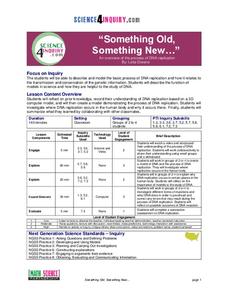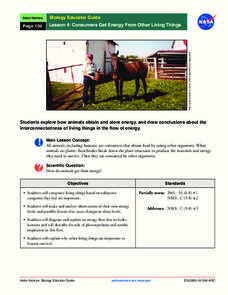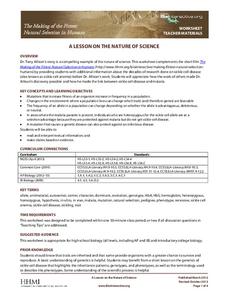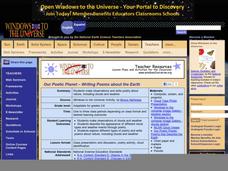Science 4 Inquiry
Atmospheric Layers
Space diving refers to the act of jumping from outer space and falling through Earth's atmosphere before parachuting to land. Scholars learn about this extreme activity and study the layers of the atmosphere they must conquer in the...
Curated OER
What Is Natural?
Your junior highers will learn about which objects are natural and classify objects as abiotic or biotic. Your class will trace human products to their natural resources using matter cycles and then create their own definition of nature.
Captain Planet Foundation
Sorting Out Soils
Sift through soil and learn about why it's important for organic processes. After discussing what makes up soil, such as the living organisms and what types of soil have more nutrients, kids sample layers of mulch and deeper soil to...
Ocean Explorer
Easy as Pi
Seamounts are large, extinct volcanoes that rise up from the bottom of the ocean floor. They are a relatively new landform in the scientific community, and this instructional activity invites students to learn about the amazing diversity...
Science 4 Inquiry
"Something Old, Something New..."
Young scientists learn about DNA replication through a video and model creation. They answer analysis questions before exploring the role of mutations and then complete a summative assessment.
Science 4 Inquiry
Levitation Engineers: Exploring Forces
Levitation tricks have been documented from the early 1900s, so how do they do it? Scholars learn about the force of magnetism in an attractive resource. They watch videos and design experiments to understand the strength and...
Towson University
Mystery of the Crooked Cell
Can your class solve the Mystery of the Crooked Cell? Junior geneticists collaborate to learn about sickle cell anemia in a fascinating lesson plan. The included materials help them to examine the genetic factors behind the disease...
National Library of Medicine
Your Environment, Your Health: Chemicals in Your Home
Many people know about chemical pollution, but are all chemicals bad? The third unit in a series of six addresses chemicals common in everyday life. Scholars learn about the chemicals found in their own homes, chemical safety, and...
Science 4 Inquiry
The Last Supper: Identifying Macromolecules
Why do medical examiners always state the contents of a person's stomach? Scholars learn about the importance of macromolecules through a case study of stomach contents. They perform multiple tests to determine a conclusion before they...
Science 4 Inquiry
Plant Structures Lab Stations
In China, hibiscus is known as the shoe flower because it is used to polish shoes, while in Hawaii, it is honored as the state flower. Young scientists learn about the structure and function of flowers. They dissect hibiscus...
NASA
Consumers Get Energy From Other Living Things
How do plants and animals get their food? Learn about where energy comes from, how animals store energy, and aerobic respiration, in a lesson that allows scholars to diagram energy flows.
Howard Hughes Medical Institute
Drug Adherence and Resistance
The FDA approved more than 25 drugs to treat HIV—and often people must use them in combination. One of the largest challenges with these medications happens due to patient error. Class members use an interactive to learn about drug...
Curated OER
Fossil Kit I - Lesson Plan
Here is a 14-page lesson plan that deftly outlines a wonderful educational experience for your youngsters. In it, students learn about a variety of animals that have left behind clues of their existence in fossil form. Many excellent...
Curated OER
Agriculture: Oklahoma's Legacy
Sixth graders explore agriculture as it relates to crops over the course of a series of historical events. They read and create a timeline of the 50-year increments that depict important cause and effect events. Students then use...
Curated OER
The Impact
Learn about the destruction of the rainforest by analyzing statistics. Young learners make an original line graph showing destruction in the rainforest. Additional activities include making a collage, sequencing Dr. Seuss' The...
Environmental Protection Agency (EPA)
Learn About Chemicals Around Your House
Take a house tour and play some games to learn about household products that have chemicals and how to be safe around them. From the U.S. Environmental Protection Agency (EPA).
Curated OER
Shadows & Light, Science & Puppetry
Lights, shadows, action, and inquiry await your artistic scientists. They explore the way light travels, absorbs, reflects, and transmits through shadow play. They create folktale-inspired shadow puppets, explore the science of light,...
Education World
Thinking About Thanksgiving: Lessons Across the Curriculum
Bring two integrated curriculum resources about Thanksgiving to an elementary social studies unit. The first activity focuses on Squanto's contributions to the early Pilgrims' survival with a gardening activity in which learners add...
Kenan Fellows
The Effects of Environmental Conditions on Aquatic Organisms
What kind of experiment can your class do to how observe the environment effects on organisms? Groups design and conduct lab experiments to learn about the effects of the environment on aquatic organisms. Based upon knowledge gained...
National Endowment for the Humanities
Kennewick Man: Science and Sacred Rights
"Have respect for the dead!" Scholars investigate how science and religion often clash. As they look into the laws of science and the laws of religion, the legal ramifications at the federal level of both play into an argument they...
Howard Hughes Medical Institute
A Lesson on the Nature of Science
If you are looking for a great way to present natural selection in humans, look no further. This handout is intended to accompany the 14-minute video The Making of the Fittest: Natural Selection in Humans, which can be found on the...
Curated OER
Pumpkin Science
Fourth graders examine pumpkins and use the scientific method to explore its contents. In this Pumpkin Science lesson plan, 4th graders measure pumpkins for circumference. Students dress as if they were in a lab and work in pairs...
Curated OER
Our Poetic Planet - Writing Poems about the Earth
As a way to combine language arts and science, try this lesson on writing cloud poetry. Begin by showing a PowerPoint presentation and images of cloud types. Take meteorology masters outdoors to explore the sky using the provided "Cloud...
Curated OER
All About Teeth
Chomp chomp! Learn which teeth perform which tasks with a thorough learning exercise on molars, incisors, and canines. Based on descriptions of each kind of tooth, fifth graders label a diagram that points to particular teeth. They then...























